Children with Hyperactivity & ADHD
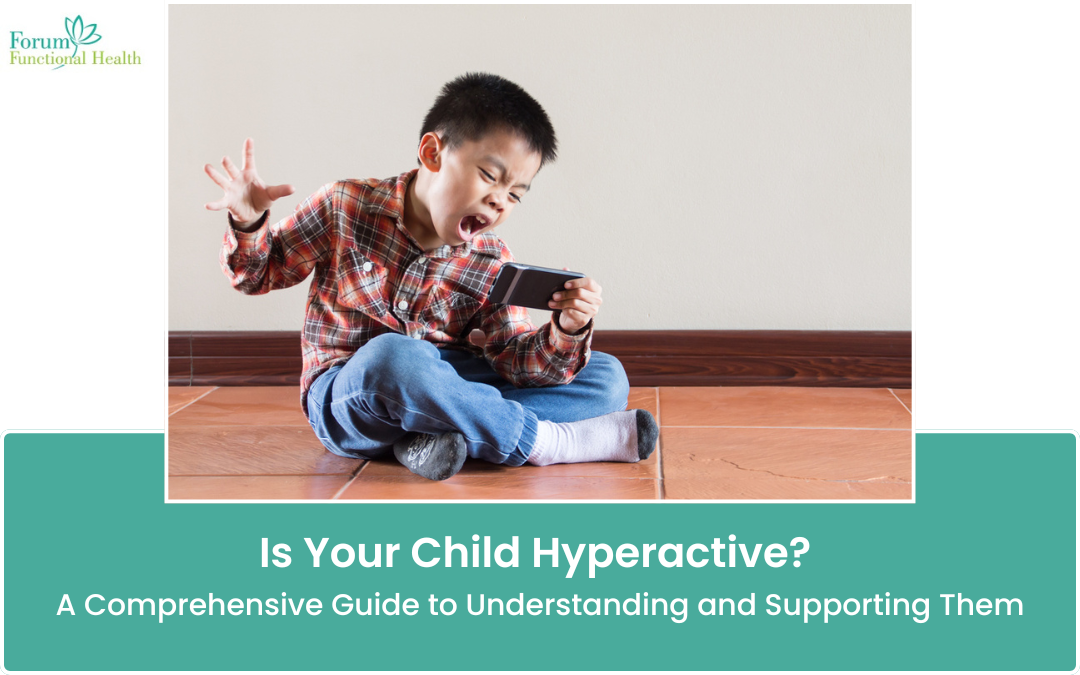
by Forum Functional Health Center | May 3, 2024 | Children with Hyperactivity & ADHD
Hyperactivity in children can present unique challenges for parents, educators, and healthcare providers alike. Understanding the signs, causes, and effective treatment options is crucial for supporting children with hyperactivity. In McKinney, Texas, the Forum Functional Health Center best Functional Health Center in McKinney Texas, offers comprehensive care tailored to meet the needs of hyperactive children and their families.
Supporting Your Child with Hyperactivity
Supporting your child with hyperactivity requires patience, understanding, and a willingness to adapt. Here are some strategies to help:
- Create a Structured Environment: Establish a consistent daily routine to help your child feel secure.
- Encourage Physical Activity: Regular exercise can help manage hyperactivity.
- Provide Positive Reinforcement: Recognize and reward your child’s efforts to manage their behavior.
- Seek Professional Guidance: Don’t hesitate to consult with professionals at the Forum Functional Health Center for personalized advice.
Understanding Hyperactivity
Hyperactivity is characterized by excessive activity, impulsivity, and difficulty maintaining attention. While it’s normal for children to have high energy levels, hyperactivity goes beyond typical behavior and can significantly impact daily functioning. Common signs of hyperactivity include restlessness, fidgeting, interrupting others, and difficulty staying focused.
Causes of Hyperactivity
There is no single cause of hyperactivity, but a combination of genetic, environmental, and neurological factors may contribute to its development. Genetics play a significant role, with hyperactivity often running in families. Additionally, factors such as prenatal exposure to toxins, premature birth, and early childhood trauma can increase the risk of developing hyperactivity.
- Difficulty sitting still
- Excessive talking
- Difficulty waiting their turn
- Difficulty playing or engaging in leisure activities quietly
- Easily distracted
- Often fidgets or squirms
Hyperactivity Treatment in McKinney, Texas
For parents in McKinney, Texas, seeking treatment for their hyperactive child, the Forum Functional Health Center stands out as a leading provider of comprehensive care. you can contact for Hyperactivity Treatment in McKinney, Texas
Forum Functional Health Center: Your Partner in Hyperactivity Treatment
The Forum Functional Health Center is dedicated to providing personalized care for children with hyperactivity. Their team of experienced professionals uses a holistic approach to address the root causes of hyperactivity, ensuring a supportive environment for your child to grow and thrive.
Services Offered
- Behavioral Therapy: Techniques to help manage hyperactivity and improve focus.
- Medication Management: Guidance on appropriate medications to manage symptoms.
- Educational Support: Assistance in understanding and managing hyperactivity in the classroom.
- Family Therapy: Strategies to support the entire family in managing hyperactivity.
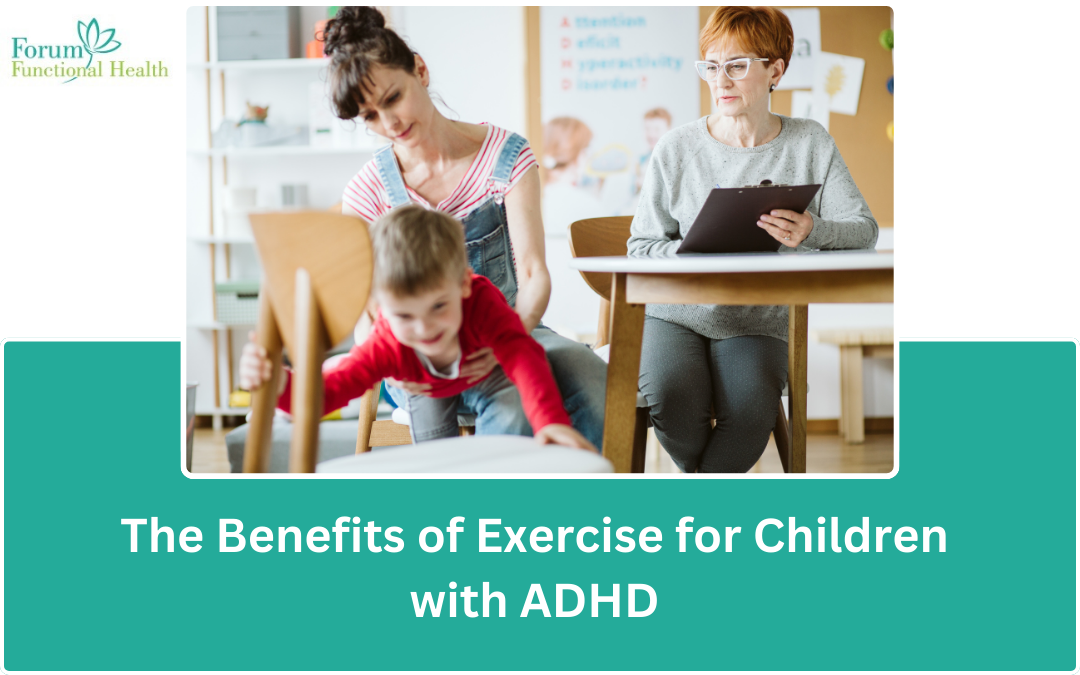
by Forum Functional Health Center | Mar 28, 2024 | Children with Hyperactivity & ADHD
Attention Deficit Hyperactivity Disorder (ADHD) is a neurodevelopmental disorder that affects millions of children worldwide, impacting their ability to focus, control impulses, and regulate energy levels. While medication and therapy are commonly used treatments, research suggests that exercise can also play a significant role in managing ADHD symptoms. In this blog, we’ll delve into the benefits of exercise for children with ADHD, exploring how physical activity can enhance focus, mood, and overall well-being.
Improved Focus and Concentration
Regular exercise has been shown to boost cognitive function, including attention and concentration, which are areas often affected by ADHD. When children engage in physical activity, they experience increased blood flow to the brain, promoting the release of neurotransmitters like dopamine and serotonin, which are essential for attention regulation. Studies have found that even a single session of moderate-intensity exercise can lead to immediate improvements in attention and focus, making it a valuable tool for managing ADHD symptoms in children.
Regulation of Energy Levels
One of the hallmark characteristics of ADHD is hyperactivity, where children often struggle to channel their excess energy appropriately. Exercise provides a constructive outlet for this energy, helping children with ADHD regulate their activity levels and reduce impulsivity. Activities such as running, cycling, or playing team sports not only burn off excess energy but also teach children valuable skills such as self-control and discipline, which can translate into better behavior both at home and in school.
Mood Enhancement and Stress Reduction
Children with ADHD are more susceptible to mood swings, anxiety, and stress due to the challenges they face in managing their symptoms. Exercise acts as a natural mood enhancer, stimulating the production of endorphins, which are known as the body’s “feel-good” chemicals. By engaging in regular physical activity, children with ADHD can experience reduced levels of anxiety and stress, leading to improved emotional well-being and resilience. Additionally, participating in sports or group activities provides opportunities for social interaction and peer support, further boosting mood and self-esteem.
Better Sleep Quality
Sleep problems are common among children with ADHD, with difficulties falling asleep and staying asleep being prevalent issues. Regular exercise can help regulate sleep patterns by promoting relaxation and reducing insomnia symptoms. Physical activity during the day helps to expend energy reserves, making it easier for children to unwind and fall asleep at night. Moreover, the release of serotonin during exercise can contribute to a more restful and deeper sleep, allowing children to wake up feeling refreshed and ready to face the day ahead.
Enhanced Brain Function and Academic Performance
Exercise not only benefits physical health but also has positive effects on cognitive function and academic performance. Research has shown that children who engage in regular physical activity demonstrate improved memory, problem-solving skills, and academic achievement compared to their less active counterparts. By incorporating exercise into their daily routine, children with ADHD can optimize brain function, leading to better focus, retention of information, and overall academic success.
Incorporating exercise into the daily routine of children with ADHD can significantly contribute to their overall health and well-being. As healthcare professionals, it’s crucial to educate parents and caregivers about the importance of physical activity in managing ADHD symptoms. Additionally, collaborating with schools and community organizations to provide accessible opportunities for children with ADHD to engage in sports and recreational activities can further support their development and success. Together, we can empower children with ADHD to thrive and reach their full potential through the power of exercise.
Forum Functional Health Care as healthcare professionals, it’s imperative that we recognize the pivotal role exercise plays in the holistic management of ADHD. By advocating for the integration of physical activity into the daily lives of children with ADHD, we not only address their immediate symptoms but also promote long-term well-being and success. Through collaborative efforts with parents, schools, and community organizations, we can create environments that facilitate regular physical activity and empower children with ADHD to lead fulfilling lives.
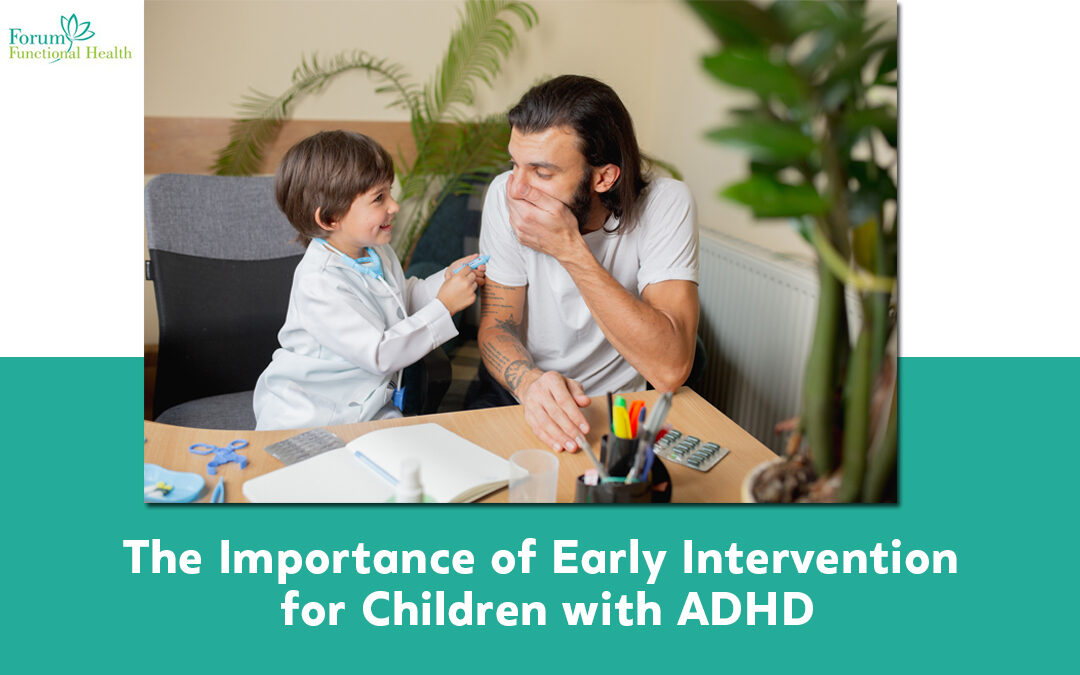
by Forum Functional Health Center | Feb 23, 2024 | Children with Hyperactivity & ADHD
Attention Deficit Hyperactivity Disorder (ADHD) is a neurodevelopmental disorder that affects millions of children worldwide. While it can present challenges in various aspects of a child’s life, early intervention plays a crucial role in managing symptoms and improving outcomes. In this blog, we’ll explore the importance of early intervention for children with ADHD, discussing its benefits, strategies, and the role of healthcare professionals in providing support.
Understanding ADHD: What is it and How Does it Impact Children?
ADHD is characterized by persistent patterns of inattention, hyperactivity, and impulsivity that can interfere with a child’s functioning at home, school, and in social settings. Children with ADHD may struggle with staying focused, following instructions, and controlling their impulses, leading to academic difficulties, behavioral problems, and challenges in forming relationships.
The Benefits of Early Intervention
Early intervention refers to identifying and addressing ADHD symptoms as soon as they arise, ideally during early childhood. There are several benefits to intervening early
1. Improved Academic Performance: Early intervention can help children develop strategies to manage their symptoms, leading to better academic performance and increased engagement in learning activities.
2. Enhanced Social Skills: By addressing ADHD symptoms early, children can learn social skills and coping mechanisms that facilitate positive interactions with peers and adults.
3. Reduced Risk of Co-occurring Conditions: Early intervention can mitigate the risk of developing secondary conditions such as anxiety, depression, and conduct disorders, which are common among individuals with ADHD.
4. Better Long-Term Outcomes: Research suggests that children who receive early intervention for ADHD are more likely to experience positive long-term outcomes, including improved educational attainment and employment prospects.
The Strategies for Early Intervention
Early intervention for ADHD typically involves a multi-faceted approach that addresses various aspects of a child’s life. Some effective strategies include:
1. Behavioral Therapy: Behavioral therapy techniques, such as cognitive-behavioral therapy (CBT) and parent training, can help children and their families develop skills to manage symptoms and improve communication.
2. Educational Support: Collaboration between parents, teachers, and healthcare professionals is essential in creating an educational plan tailored to the child’s needs, which may include accommodations, modifications, and specialized instruction.
3. Medication Management: In some cases, healthcare providers may recommend medication to help manage ADHD symptoms. Early intervention allows for careful monitoring and adjustment of medication to achieve optimal results.
4. Lifestyle Modifications: Encouraging healthy lifestyle habits, such as regular exercise, adequate sleep, and a balanced diet, can support overall well-being and may help alleviate ADHD symptoms.
The Role of Healthcare Professionals
Healthcare professionals, including pediatricians, psychologists, and occupational therapists, play a crucial role in early intervention for ADHD. They can conduct comprehensive assessments, provide evidence-based interventions, and offer guidance and support to families navigating the challenges of ADHD.
Early intervention is key to effectively managing ADHD and improving outcomes for children. By addressing symptoms early and implementing appropriate strategies and support systems, children with ADHD can thrive academically, socially, and emotionally. At Forum Functional Health Center, we recognize the importance of early intervention and take a holistic approach to evaluate and address the underlying factors contributing to ADHD symptoms. By addressing hormonal, gastrointestinal, and detoxification systems, as well as food sensitivities and nutritional imbalances, we strive to optimize the health and well-being of every child we serve.
At Forum Functional Health Center, we evaluate all of the three main body systems hormonal, gastrointestinal, and detoxification, as well as evaluate for food sensitivities and nutritional imbalances. Many times correcting the underlying malfunctioning body system or systems, and adjusting a few lifestyle habits, including diet, are enough to make hyperactivity a thing of the past. As we see all too often in practice, each one of these body systems, if not functioning properly, affects the others. These systems do not function independently of each other. This is the main reason we test and help you correct all three of the main body systems to bring about the optimal health you desire for your child.
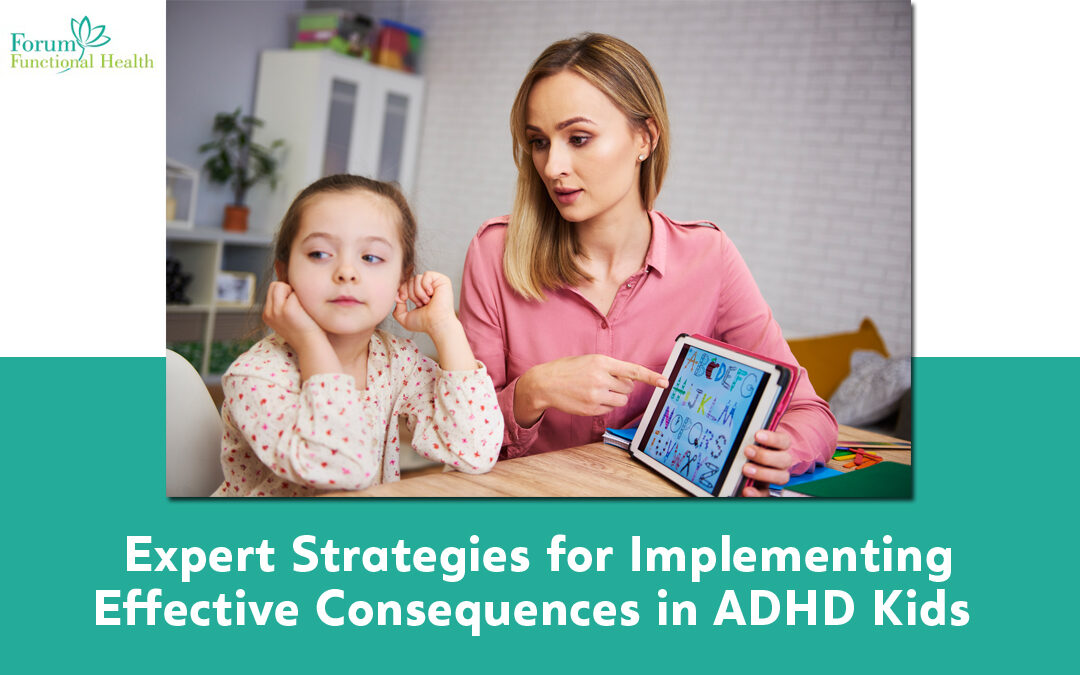
by Forum Functional Health Center | Jan 11, 2024 | Children with Hyperactivity & ADHD
Children with Attention Deficit Hyperactivity Disorder (ADHD) and those who look after them face unique problems in managing the condition. Behavioural strategies must be strategically applied in order to manage ADHD since they provide structure and foster healthy development. This article explores the use of behavioural strategies and, more especially, consequences that are carefully tailored to create an environment that supports the success of kids with ADHD.
Understanding ADHD and Behavioural Challenges
Attention Deficit Hyperactivity Disorder, or ADHD, is a condition that can affect both adults and children. It causes difficulties with organisation, attention, and impulse control, which can have an influence on social relationships and academic achievement, among other aspects of life.
It’s critical to offer kids with ADHD consistent and understandable behavioural tactics. These ought not to be harsh; rather, they ought to be guidelines for developing success-critical abilities. Effective behaviour and emotional regulation in children can be taught through the implementation of routines, expectations, and positive reinforcement.
Managing ADHD requires a structured atmosphere, which must be established. This entails keeping a regular daily schedule and providing a space set aside for work or study that is distraction-free. Tasks can be completed more successfully and with greater attention when broken down into smaller, more manageable steps. This helps to create an environment that is more regulated and organised.
Teaching self-regulation skills to those with ADHD is equally important. They are empowered to regulate impulsivity and improve attention span through practices including deep breathing exercises, mindfulness, and creating attainable goals. Task attention and decision-making abilities are gradually enhanced by the regular application of these techniques.
Creating a supportive environment
The first step in implementing behavioural tactics successfully is to create a supportive atmosphere. Children with ADHD feel more secure when there are clear expectations and consistent routines in place. Encourage a well-organised daily schedule that provides regularity to help reduce stress and impulsivity.
Adapting Penalties to ADHD
A key element of behavioural strategies is consequences. On the other hand, it’s critical to adjust punishments to the specific needs of the child when dealing with ADHD. Put more emphasis on consequences that foster self-awareness and learning than on punitive actions.
Adapting Discipline to ADHD Kids
A key element of behavioural strategies is consequences. On the other hand, it’s critical to adjust punishments to the specific needs of the child when dealing with ADHD. Put more emphasis on consequences that foster self-awareness and learning than on punitive actions.
Positive Reinforcement: Create a system of rewards to incentivize good behaviour. Employ a token or point system so that the child can receive incentives for finishing activities or acting in a way that is suitable. This encouraging feedback fosters self-assurance and motivation.
Time-Outs with Reflection: When disruptive behaviours occur, think about utilising time-outs as a chance for introspection rather than as a form of punishment. Give the youngster a moment to reflect on what they did and talk about other possible courses of action.
Collaborative problem-fixing: Engage the young person in conversations about fixing problems. Together, explore the negative effects of particular actions and come up with some better, more positive solutions.
Instant Feedback: Children with ADHD frequently gain from receiving immediate feedback. As soon as a behaviour happens, give feedback to help reinforce the link between behaviour and outcomes.
Implementing behavioural strategies:
Individualised Behaviour Plans: Create customised behaviour plans in collaboration with educators, therapists, and carers, taking into account the unique requirements and difficulties of each child. These plans ought to be flexible enough to change as the youngster develops.
Communication and Consistency: Develop open lines of communication between parents, teachers, and other professionals involved in the child’s care. This will help ensure consistency. Maintaining consistency in many settings aids in reinforcing behavioural standards, giving the youngster a solid basis.
Teaching Coping Skills: Equip ADHD children with coping skills to manage frustration and impulsivity. Teach them relaxation techniques, mindfulness, or simple exercises to redirect their focus during challenging moments.
Parental Involvement: Engage parents actively in the implementation of behavioural strategies. Provide resources, workshops, and ongoing support to help parents understand and effectively employ these strategies at home.
Developing effective consequences for ADHD children necessitates a deliberate and personalised approach. Carers and educators may help these children succeed by creating a supportive atmosphere, understanding the unique challenges of ADHD, and adopting a balanced mix of positive reinforcement and punishments. Consistency, open communication, and a collaborative approach become essential in fostering a favourable developmental trajectory for ADHD children, ultimately allowing them to thrive in various facets of their lives.
When it comes to providing Forum Functional Healthcare support for ADHD, a licenced functional medicine practitioner uses a comprehensive strategy to pinpoint possible hyperactive triggers. This entails investigating elements that are frequently linked to children’s hyperactivity, such as poor digestion, dietary and environmental allergens, abnormalities in fatty and amino acids, nutritional deficits, and heavy metal toxicity. Remarkably, data suggest that children who exhibit hyperactivity often get recurrent ear infections. Antibiotic therapy for certain diseases may result in dysbiosis, which can change the usual flora in the gut and cause inflammation in the brain. For complete ADHD management, addressing these underlying problems with practical healthcare measures becomes essential.
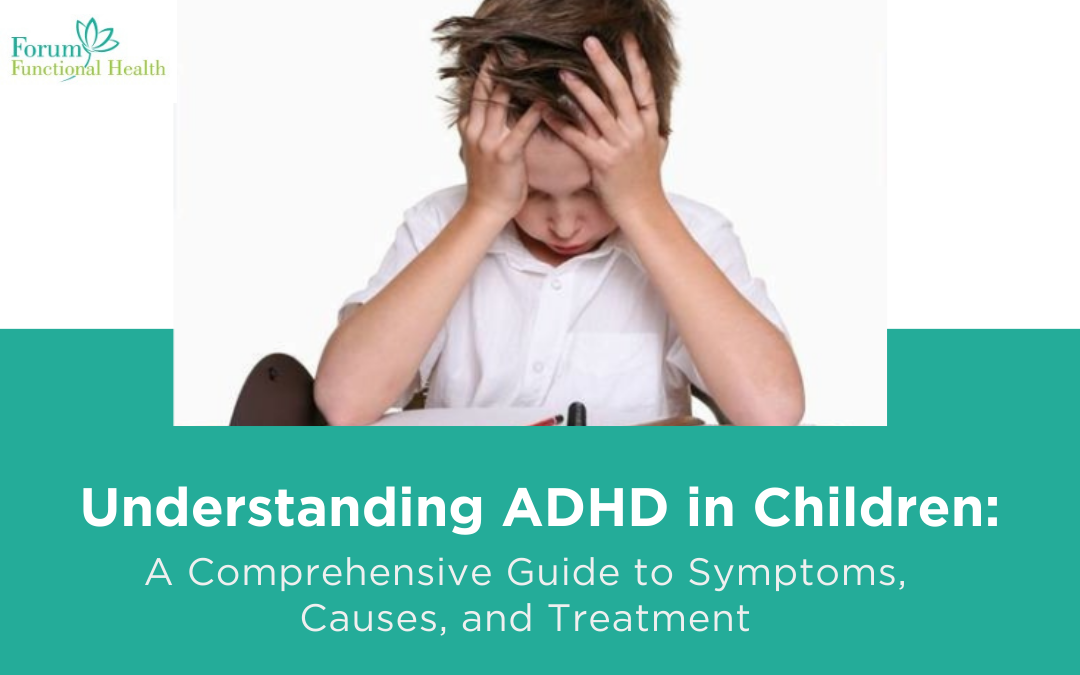
by Forum Functional Health Center | Dec 18, 2023 | Children with Hyperactivity & ADHD
Attention Deficit Hyperactivity Disorder (ADHD) is a neurodevelopmental disorder that affects millions of children worldwide. It is characterized by symptoms such as inattention, hyperactivity, and impulsivity, and can significantly impact a child’s academic performance, social relationships, and overall well-being. Understanding ADHD is crucial for parents, educators, and healthcare professionals alike, as early detection and intervention can greatly improve a child’s quality of life. In this comprehensive guide, we will explore the symptoms, causes, and treatment options for ADHD, providing valuable insights and practical strategies for managing this complex disorder.
What is ADHD and why is it important to understand it?
ADHD is a neurodevelopmental disorder that affects a child’s ability to pay attention, control impulsive behavior, and manage hyperactivity. It is a complex condition that can manifest in various ways, with symptoms varying from mild to severe. Understanding ADHD is crucial for several reasons.
Firstly, when parents, educators, and healthcare professionals have a comprehensive understanding of ADHD, they can recognize the symptoms early on and seek appropriate intervention. Early detection is vital for providing the necessary support and resources to help children with ADHD reach their full potential.
Understanding ADHD can help dispel misconceptions and reduce stigma. By promoting awareness and understanding, we can foster inclusive environments that support children with ADHD, allowing them to thrive in various aspects of their lives.
A thorough understanding of ADHD can guide treatment decisions. By knowing the different treatment options available, parents, educators, and healthcare professionals can collaborate to develop individualized plans that address the unique needs of each child with ADHD.
Recognizing the symptoms of ADHD in children
Recognizing the symptoms of ADHD in children is crucial for early intervention and providing the necessary support. While the symptoms can vary from child to child, there are some common signs to look out for.
One of the primary symptoms of ADHD is difficulty paying attention. Children with ADHD may struggle to concentrate on tasks, have a short attention span, and easily become distracted. They may also exhibit impulsive behavior, such as interrupting others or acting without thinking.
Another common symptom of ADHD is hyperactivity. Children with ADHD may have difficulty sitting still, constantly fidget, or feel restless. They may also talk excessively or have trouble participating in activities that require quiet and focused attention.
It is important to note that not all children with ADHD will display hyperactivity. Some children may predominantly demonstrate inattentive symptoms, such as being forgetful, losing things, or having difficulty organizing tasks.
The possible causes of ADHD in children
While the exact cause of ADHD is still unknown, researchers have identified several potential factors that may contribute to the development of this condition in children. It is believed that a combination of genetics, environmental factors, and brain structure plays a role in ADHD.
Genetics is considered to be one of the primary factors in ADHD. Studies have shown that children with a family history of ADHD are more likely to develop the condition themselves. Certain genes related to neurotransmitters, such as dopamine, have been found to be linked to ADHD.
Environmental factors can also influence the development of ADHD. Exposure to substances like tobacco smoke, alcohol, and drugs during pregnancy has been associated with an increased risk of ADHD in children. In addition, premature birth, low birth weight, and exposure to lead or other toxins in early childhood may also be contributing factors.
Brain structure abnormalities have been observed in children with ADHD. Brain regions responsible for attention, impulse control, and executive functions show differences in size and activity in individuals with ADHD. These differences may affect the communication between brain cells and the regulation of neurotransmitters.
The importance of early diagnosis and treatment
Early diagnosis and treatment play a crucial role in managing ADHD in children. Identifying the symptoms and getting a proper diagnosis at an early stage can significantly improve the child’s overall well-being and academic performance.
When ADHD is left untreated, it can lead to various challenges and difficulties for the child. These include academic struggles, impaired social relationships, and low self-esteem. However, with the right interventions and support, children with ADHD can thrive and reach their full potential.
Treatment for ADHD typically involves a combination of different approaches, including behavioral therapy, medication, and educational support. Behavioral therapy helps children develop and practice essential skills such as organization, time management, and self-regulation. Medications, such as stimulants or non-stimulants, may be prescribed in some cases to help manage the symptoms of ADHD.
Effective treatments for managing ADHD in children
In this section, we will explore the various effective treatments available for managing ADHD in children. Effective treatment strategies for ADHD often involve a combination of different approaches, tailored to suit the individual needs of each child. Here, we will delve deeper into each treatment option, examining their benefits, potential side effects, and how they can be integrated into a comprehensive treatment plan.
Behavioral therapy is a key component of ADHD treatment, helping children develop essential skills such as organization, time management, and self-regulation. We will discuss different types of behavioral therapy and how they can positively impact a child’s overall functioning. Additionally, we will explore the role of medication in managing ADHD symptoms, providing insights into stimulant and non-stimulant options, their effectiveness, and any potential side effects.
Education support is also essential for children with ADHD, so we will discuss how to create a supportive learning environment and implement strategies that can aid their academic success. Through this comprehensive approach, we can equip parents and caregivers with the knowledge and tools needed to effectively manage ADHD in children.
Supporting children with ADHD in educational settings
In this section, we will focus on the crucial role of education support in the lives of children with ADHD. Creating a supportive learning environment and implementing strategies that can aid their academic success is essential for their overall development.
We will explore different approaches that can be implemented in educational settings to support children with ADHD. One such approach is creating an individualized education plan (IEP) that identifies specific goals, accommodations, and modifications to meet the unique needs of the child. We will discuss how an IEP can provide structure, support, and necessary interventions to help children succeed academically.
Additionally, we will delve into the importance of effective communication and collaboration between parents, teachers, and other professionals involved in the child’s education. By establishing open lines of communication and working together, we can ensure consistent support and tailored strategies for the child.
We will provide practical tips for teachers to implement in the classroom, such as creating clear routines, incorporating movement breaks, and utilizing visual aids. These strategies can help children with ADHD stay focused, engaged, and maximize their learning potential.
Coping strategies for parents and caregivers
In addition to implementing educational support strategies in the school setting, it is important for parents and caregivers to also understand and employ coping strategies to support their child with ADHD.
Firstly, it is essential to educate yourself about ADHD and its impact on your child’s behavior and development. Understanding the symptoms, causes, and treatment options can help you better support and advocate for your child.
Next, establishing a consistent routine and structure at home can greatly benefit children with ADHD. Creating a predictable schedule and setting clear expectations can help reduce anxiety and increase their sense of control.
Furthermore, practicing effective communication with your child is key. Use clear and concise instructions, break tasks into smaller, manageable steps, and provide positive reinforcement for their efforts.
Additionally, encourage physical activity and provide outlets for their energy. Engaging in regular exercise or participating in sports and recreational activities can help channel their excess energy and improve focus.
Lastly, seek support from professionals, support groups, or other parents in similar situations. Sharing experiences and resources can help you navigate the challenges of parenting a child with ADHD and provide you with additional coping strategies.
Empowering children with ADHD for a successful future
In conclusion, understanding and actively implementing coping strategies can make a significant difference in the lives of children with ADHD. By educating yourself about the disorder and its impact, establishing consistent routines, practicing effective communication, encouraging physical activity, and seeking support, you can create a supportive and empowering environment for your child.
Remember, ADHD is not a barrier to success. With the right tools and support, your child can thrive and reach their full potential. By providing them with the resources they need and advocating for their needs, you are setting them up for a successful future.
Keep in mind that every child is unique, and what works for one may not work for another. It may take time to find the strategies that resonate with your child, but with patience and persistence, you can help them overcome challenges and develop the skills necessary for success.





